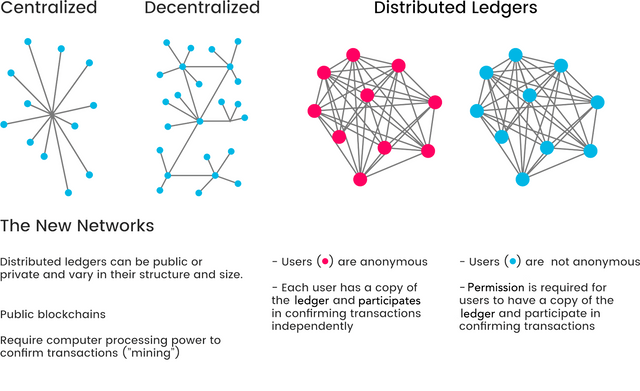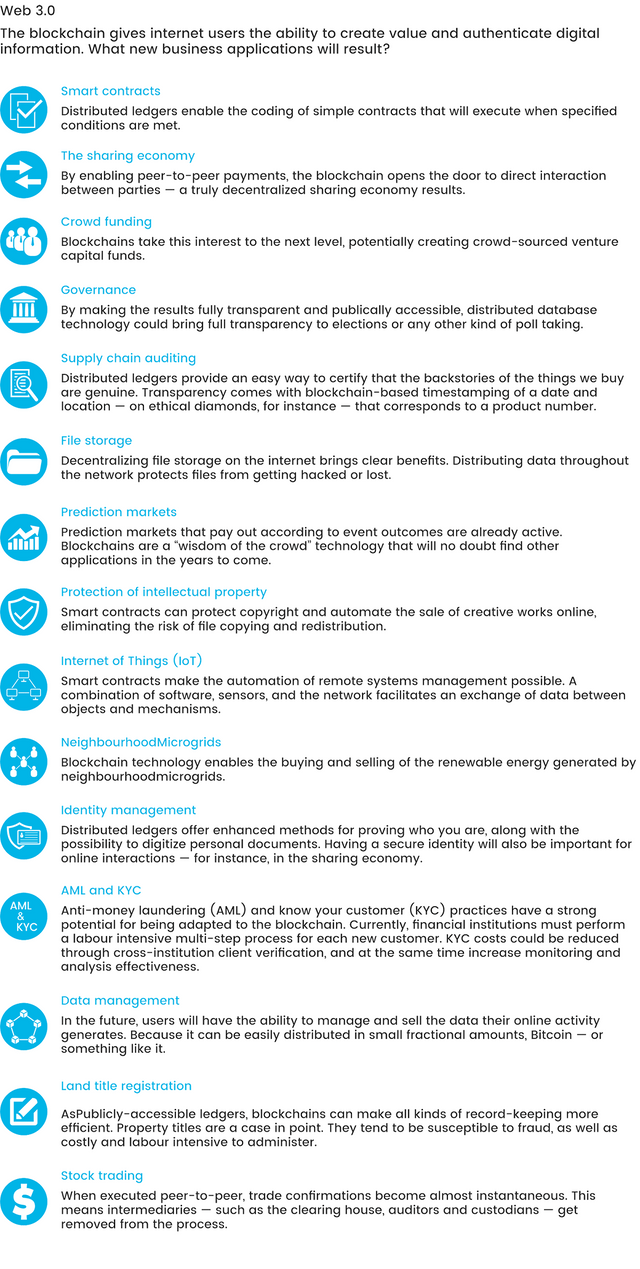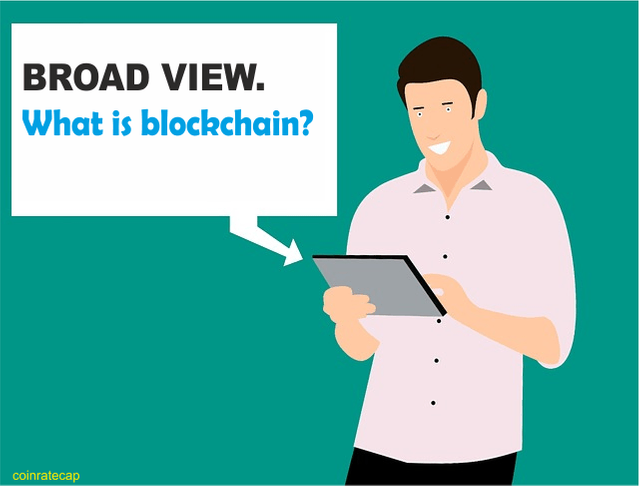What is blockchain? Broad overview
𝗢𝗨𝗧𝗟𝗜𝗡𝗘
What is blockchain?
How does it work?
Why you should know about blockchain?
What Blockchain technology Is Used For?
How can it be used in the wider enterprise?
The most prominent advantages/value of Blockchain.
The future of Blockchain.
𝗪𝗵𝗮𝘁 𝗶𝘀 𝗯𝗹𝗼𝗰𝗸𝗰𝗵𝗮𝗶𝗻?
As the name suggests, blockchain is basically a long chain of “blocks” where each “block” is a piece of information. Just like a chain, each block is innately linked to the block behind it, and the block ahead of it. Each
block includes its primary data, a receipt of a bitcoin transaction or any financial transaction, for example, a sort of digital fingerprint known as a “hash.” But the interesting part is that each block also features the hash of the previous block. That means removing one block or changing the order of the blocks is impossible. This aspect of blockchain lends itself to a wide variety of use cases in which “trust” is paramount.
In a broad view, blockchain is a transparent and incorruptible digital ledger and a continuous growing list of records called blocks, which are securely linked using cryptography.
If the information inside of a block changes, the hash changes as well which creates a new chain and invalidates the previous chain.
It’s important to note that there can be both public and private
Blockchains. With the latter seeing more extensive use in enterprises and private business practices.
A "block" works like this BLOCK - Data(hello world) - Previous hash - Hash(this is like a fingerprint)
Every member of a blockchain database has a copy of the full chain and receives each new block one by one. Unlike a centralized database that could be altered from one primary location, any tampering with a blockchain would notify every member of the database that something has been altered.
While technically a Blockchain can exist without the need for a cryptocurrency (Bitcoin) in a private environment, they generally become a requirement in a public Blockchain due to the fact that they are used as rewards for miners to uphold the decentralized database.
Blockchain by nature is decentralized, meaning that there is no central authority (e.g. traditional financial institutions) and no single party can change records. And while the Bitcoin craze may have brought blockchain to the forefront of consumer radar, this is one of the major use cases that only scratches the surface of blockchain's potential.

𝗛𝗼𝘄 𝗱𝗼𝗲𝘀 𝗶𝘁 𝘄𝗼𝗿𝗸?
The blockchain is an interconnection of different nodes. All data in a Blockchain is represented as blocks. Each separate transaction means that a new block is created in a Blockchain. A Blockchain records data linearly which means that every new block contains information from all previous blocks in addition to the new data that is being added.
A block stores multiple of transactions, each block is made up of a ledger of information which could be a date, time and encrypts information with the help of complex algorithms. When a party submits a change to an existing transaction or new transaction on the ledger, it must be approved and validated by another party before the transaction can be officially added to the blockchain network. This means every participant of the network has a copy of the blockchain. Therefore, if an attacker modifies the blockchain on one of the computers in the network, they are modifying only one single copy of the blockchain. The network will see this, compare it with the prevailing majority of versions of the blockchain in the network and quickly override it.
An attacker can only hack into a blockchain when it takes control of the 50-55% of the network.
Blockchain transactions are completed through what is known as “smart contracts”—i.e. automated contracts that transfer funds in cryptocurrency once certain conditions are met. So, every time a change occurs on the blockchain, say I send you some cryptocurrency (perhaps a KeyoCoin token to reward you for staying at my hotel), a new line is written into that database, confirming that I have ceded possession of one KeyoCoin, and you now own it.
Blockchain technology can be applied in the following ways:
-To manage customer identity and data privately and securely.
-To store important financial records in a decentralized (and encrypted) network.
To reduce human error and make processes (such as dispute resolutions) much more efficient.
This is infographic view of how blockchain works.

𝐖𝐡𝐚𝐭 𝐛𝐥𝐨𝐜𝐤𝐜𝐡𝐚𝐢𝐧 𝐭𝐞𝐜𝐡𝐧𝐨𝐥𝐨𝐠𝐲 𝐢𝐬 𝐮𝐬𝐞𝐝 𝐟𝐨𝐫?
According to Forbes, "Blockchain is widely known to be the technology behind cryptocurrencies like Bitcoin and ethereum, but blockchain is much more than an instrument of financial services.
The blockchain is an encrypted (with hashes) database of agreements. This means once a "deal" is made, none of the parties can go back and rewrite the terms. The use of smart contracts is a perfect example of what blockchain is used for.
Blockchain technology is now being adopted in such industries as banking,
e-commerce and retail, healthcare, charity, real estate, etc.
𝗟𝗲𝘁’𝘀 𝗿𝗲𝘃𝗶𝗲𝘄 𝘀𝗼𝗺𝗲 𝘂𝘀𝗲 𝗰𝗮𝘀𝗲𝘀.
𝗕𝗮𝗻𝗸𝗶𝗻𝗴
Blockchain allows for faster transactions (less than three business days as it is usually stated by banks). Moreover, transaction fees are much lower which saves money.
- 𝐄-𝐜𝐨𝐦𝐦𝐞𝐫𝐜𝐞 𝐚𝐧𝐝 𝐫𝐞𝐭𝐚𝐢𝐥
Blockchain will help these industries solve such fundamental problems like issues with payments, supply chain management, customer data security, and many others.
- 𝐇𝐞𝐚𝐥𝐭𝐡𝐜𝐚𝐫𝐞
Blockchain technology is able to ensure transparency and integrity in such things as drug records, prescriptions, patient data storage, treatment records, records about clinical researches, etc.
• 𝐂𝐡𝐚𝐫𝐢𝐭𝐲
The Blockchain is able to prevent corruption and all kinds of malicious intents within charitable organizations. Due to transparency and immutability, people are able to track how their donations are spent.
- 𝐑𝐞𝐚𝐥 𝐞𝐬𝐭𝐚𝐭𝐞
Blockchain can help unify and standardize real estate records that are often incorrect and unreliable. It will be also impossible to counterfeit data for illegal purposes. All this will make the process of selling and purchasing real estate faster and transparent. See use case of blockchain in the land registry.
There are much more spheres that Blockchain technology can disrupt with its innovative approach to dealing with data. Think of voting, governance,
insurance, agriculture, education, entertainment, energy, climate, and environment.
Take health care and real estate as two prime examples. A health insurance automatically pays out as soon as your hospital uploads proper documentation of your illness or surgery. In the same way, a real estate deal can conclude once your bank electronically verifies the loan. Applications on a blockchain network (like Ethereum) enable this process.
One of the blockchain’s use cases is analogous to automated escrow accounts in the real world; financial services and supply chains already have seen significant blockchain adoption.
See the infographic for more;
𝐖𝐡𝐲 𝐲𝐨𝐮 𝐬𝐡𝐨𝐮𝐥𝐝 𝐤𝐧𝐨𝐰 𝐚𝐛𝐨𝐮𝐭 𝐛𝐥𝐨𝐜𝐤𝐜𝐡𝐚𝐢𝐧?
The days of PDFs and electronic signatures for documents are gone. Blockchain-based applications that immutably, transparently perform routine tasks (like closing on a house) not only may render title companies obsolete, but also represent a significant cost- and time-savings for account payable, accounts receivable, and collections departments.
These individual transactions are grouped together into blocks and are added to the database in a way that is cryptographically linked to all previous blocks. So, one big long chain of blocks, inextricably linked, that make it impossible to change or manipulate anything that has been previously added.
The accuracy of the information on that chain is continually verified by a community of super users that are strongly incentivized to reach consensus about the validity of that information, any anomalies (say someone trying to manipulate the data) is immediately discredited.
And importantly, the underlying information itself is encrypted, so they don't necessarily see exactly what it is they are verifying, but can still confirm that the information is correct, and has not changed.
So what's the point of this? Why would I want to have a public database of encrypted data? Why can't one trusted organization just manage the database and confirm that all the information in it is in fact correct?
𝐖𝐞𝐥𝐥, 𝐭𝐡𝐞 𝐚𝐧𝐬𝐰𝐞𝐫 𝐢𝐬...𝐢𝐭 𝐜𝐚𝐧. There is nothing to stop one organization, or even a handful of organizations, from managing a database. That's exactly how your bank knows how much money is in your current account, and an airline knows how many loyalty points you have. But there are big risks involved in doing that. You're putting all your eggs in one basket. Conflict of
interest, corruption, data integrity, all sorts of risks, which brings us on to the big revelation about blockchain. Why it really matters. Ultimately, it's because it moves us from relying on a trusted system to a trustless one.
You no longer need to trust that your bank has been keeping proper records about the amount of money Netflix is taking off you each month, or even trust that they are looking after your money. Instead, this wealth, this value, this data, is stored digitally in an immutable ledger, free from potential corruption or human error.
So those are the fundamentals. In reality, there are a huge number of potential applications for blockchain technology. Many are complete nonsense, a few have real potential, and a tiny handful is already practising what they preach.
𝐇𝐨𝐰 𝐜𝐚𝐧 𝐢𝐭 𝐛𝐞 𝐮𝐬𝐞𝐝 𝐢𝐧 𝐭𝐡𝐞 𝐰𝐢𝐝𝐞𝐫 𝐞𝐧𝐭𝐞𝐫𝐩𝐫𝐢𝐬𝐞?
Blockchain for the Internet of Things: The concept of distributing trust to a peer-to-peer network is and will continue to be essential in the world of IoT and Edge Computing. Let's take, for instance, ZEDEDA’s vision is to create an edge economy that allows apps to run anywhere. This means moving applications that run in data centres, where there is a single owner of all the infrastructure that provides the app developer with its entire virtual environment, to places where infrastructure is not owned by a single party but the services and data exchanges must be trusted and not spoofed.
𝐓𝐡𝐞 𝐦𝐨𝐬𝐭 𝐩𝐫𝐨𝐦𝐢𝐧𝐞𝐧𝐭 𝐚𝐝𝐯𝐚𝐧𝐭𝐚𝐠𝐞𝐬 𝐨𝐟 𝐁𝐥𝐨𝐜𝐤𝐜𝐡𝐚𝐢𝐧 𝐚𝐫𝐞:
• Transparency and inalterability
• Data decentralization
• Security
• Speed
• Cost efficiency
• Strict operation process
Due to the hype around Blockchain, there are many people who have heard about this technology but in fact, the majority of them don’t know what it is.
Some people think that Blockchain is about Bitcoin and cryptocurrencies but it is much more in reality.
𝐓𝐡𝐞 𝐟𝐮𝐭𝐮𝐫𝐞 𝐨𝐟 𝐁𝐥𝐨𝐜𝐤𝐜𝐡𝐚𝐢𝐧
Despite some complications and challenges, this technology has great potential for international development and worldwide adoption. Looking at the potential features blockchain possess, in future, we believe to discover more values in the blockchain.
𝗣𝗟𝗦 𝗙𝗢𝗟𝗟𝗢𝗪 𝗨𝗦:
Resteem
Twitter: https://twitter.com/coinratecap
Telegram: https://t.me/coinratecap
Facebook: https://facebook.com/coinratecap
Like and share!
